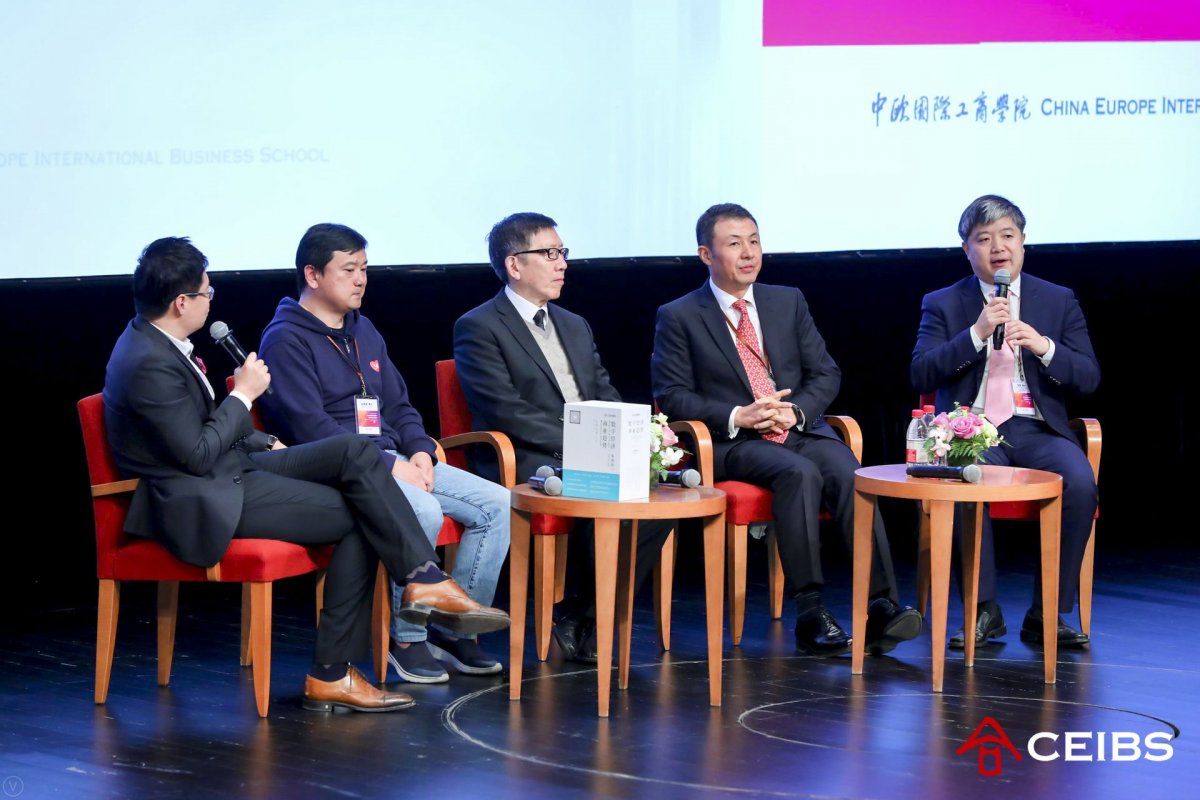How Will the Digital Economy Shape Industrial Development?
November 18, 2018. Shanghai – In a vigorous discussion of AI that went well beyond the typical questions about whether computers will steal our jobs, leading executives from Microsoft China, iFLYTEK and Yi Technologies today joined a leading academic expert to discuss the digital economy’s role in industrial development. The discussion, held at CEIBS Shanghai Campus, took place during the CEIBS 2018 Innovation and Entrepreneurship in the Digital Economy Forum.
The question of job safety was briefly address, however, by iFLYTEK Executive President and Chief Scientist Yu Hu during a speech delivered ahead of the panel discussion. As he reassured the audience that machines and humans will need to work together in the future, no matter what the technological gains made, the real-time transcript of his presentation popped up on the screen behind him, showcasing iFLYTEK’s voice recognition prowess.
Yu also shared his views, during the panel, on what digitisation means to modern companies. He believes it will impact not just traditional management-related issues but also those related to products, people and how they are managed. “But, most importantly,” he added, “will the world in which the company is operating change, and will your positon in the cosmos change as a result?”
Microsoft China Vice President Richard Feng had a less philosophical view. Referencing Gartner’s definition of the digital economy, he said, “My understanding is that it is where data is a new currency. There are new forces available, we have to make use of them. For example customers’ online complaints can be transformed into power [that this insight provides].” Earlier in his presentation, Feng had also touched upon the importance of leveraging digitalisation to provide value. “We do not innovate for the sake of innovation, but to create value for our clients,” he said. “We should not just achieve digitalisation of current business, but [also ask ourselves], what can we do to create new business?”
That was also an issue raised by Professor He Jifeng. He is a Computer Software Scientist who is also an Academician at the Chinese Academy of Sciences as well as East China Normal University’s Dean of the School of Computer Science and Software Engineering. He spoke of the transition that has been made, for example, in the added value we obtain from commodities. “Before, the added value was mainly the product itself; but now [for example] other than the selling price of a car there is additional value [that we can derive]. I can rent it to you and get an income. Or you can sit in my car and I can charge for the experience,” he said as he made the case for the need to optimise technology to change existing business models. “In the early days, technology was used to solve management problems, we used computers to do things like accounting. Now they are used everywhere from small work stations to factories, so everything will change.”
For YI Technology Founder & CEO Da Shengwei, despite the changes that are revolutionising the business world, there is one constant: data. In offering his take on how today’s companies can make use of digitalisation, he spoke about the importance of data and the need to have adequate storage. “Data is the only thing that will continue to grow exponentially. Traditional companies were about how much hardware and software they had. If data and hardware increase exponentially the only solution is algorithm to the Cloud level and the Edge level. So, in future, we should make investments in the Cloud,” he suggested. Yi Technology is a start-up artificial intelligence algorithm company whose business model is based on using less – but highly efficient – computing power to provide service to its corporate users and end consumers, now at 13 million and growing. They are trying to “make the real economy smarter [by improving] the interface between humans and machines, [closing the gap between the] real economy and physical world.”
The CEIBS 2018 Innovation and Entrepreneurship in the Digital Economy Forum was part of a broader series of events that marked the school’s annual alumni reunion weekend.













